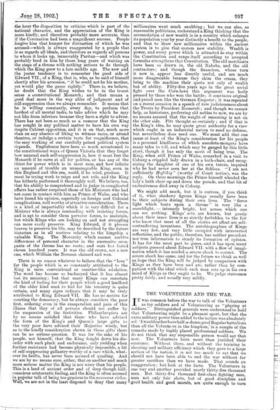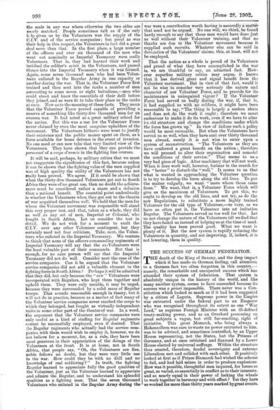THE VOLUNTEERS AND THE WAR.
IT was common before the war to talk of the Volunteers as toy soldiers and of Volunteering as "playing at soldiers." Distinguished generals were understood to hold that Volunteering might be a pleasant sport, but that the extra military power thus added to the nation was absolutely nil. would rather have half-a-dozen good Regular battalions than all the Volunteers in the kingdom,' is a sample of the remarks made by highly placed professional soldiers. We do not think that any responsible person would say that now. The Volunteers have more than justified their existence. Without them, and without the training in shooting and military efficiency which they gave to a large section of the .nation, it is not too much to say that we should not have been able to end the war without . far greater sacrifices than we have made. That sounds an exaggeration ; but look at the facts. The Volunteers in one way and another provided nearly thirty-five thousand men. But thirty-five thousand first-class -fighting 'men, men not only fair shots, but of good discipline . and good health and good morale, are quite enough to turn the scale in any war where otherwise the two sides are nearly matched. People sometimes talk as if the only help given us by the Volunteers was the supply of the C.I.V. and of the service companies; but great as was their help in this respect, the Volunteers in fact did a great deal more than that. In the first place, a large number of the officers and over six thousand of the men who went out nominally as Imperial Yeomanry were really Volunteers. That is, they had learned their work and imbibed the soldier's spirit in the Volunteers, and passed thence into the Imperial Yeomanry when it was formed. Again, some seven thousand men who had been Volun- teers .enlisted in the Regular Army in 'one capacity or another during the war. That is, the Volunteer Force first trained and then sent into the ranks a number of men amounting to some seven or eight battalions, men who could shoot and knew the essentials of their drill before they joined, and so were fit to take their place in the ranks at once. Now as to the meaning of these facts. They mean that the Volunteer Force proved capable of providing • a reserve of something like thirty-five thousand men for an oversea war. It had acted as a great military school for the nation. But this was a use for 'the Volunteer Force never claimed by even the most sanguine upholders of the movement. The Volunteers hitherto were wont to justify their existence and the public money spent on them, as a force available for home defence in the event of invasion. No one need or can now take that very limited view of the Volunteers. They have shown that they can provide the personnel of a corps d'armee in the fighting line oversea.
It will be said, perhaps, by military critics that we must riot exaggerate the significance of this fact, because unless it can be shown that the fighting value of the men' supplied was of high quality the utility of the Volunteers has not really been proved. We agree. If. it could be shown that when the thirty-five thousand Volunteers got out to South Africa they were of no great use, then no doubt the achieve- ment must be considered rather a snare and a delusion than a national benefit. The essential point undoubtedly is whether the Volunteers when they got out to the theatre of war acquitted themselves well. We hold that the men for whom the Volunteer movement was responsible will stand this very proper test, and that, taken as a whole, they did as well as any set of men, Imperial or Colonial, who fought in South Africa. Let us consider the test in detail. We do not wish for a moment to exalt the C.I.V. over any other Volunteer contingent, but they certainly need not fear criticism. Take, next, the Volun- teers who enlisted in the Imperial Yeomanry. We venture to think that none of the officers commanding regiments of Imperial Yeomanry will say that the ex-Volunteers were the least valuable part of their commands. But that is enough, for no sane person will say that the Imperial Yeomanry did not do well. Consider next the case of the service companies. Can it be argued. that the Volunteer service companies did not and a valuable element to the fighting force in South Africa ? Perhaps it will be admitted that they did, but only because the " raw " Volunteers were incorporated with Regulars, who kept them together and upheld them. They were only useable, it may be urged, because they were surrounded by a solid mass of Regular troops. That sounds reasonable enough in theory, but it will not do in practice, because as a matter of fact many of the Volunteer service companies never reached the corps to which they belonged, but fought as virtually independent units in some other part of the theatre of war. In a word, the argument that the Volunteer service companies were only useful as a kind of stuffing for Regular regiments cannot be successfully employed, even if desired. That he Regular regiments who actually had the service com- panies with them would wish to employ it, however, we do not believe for a moment, for, as a rule, they have been most generous in their appreciation of the doings of the Volunteers at the front. It is at home, not in South Africa, that people say, " Oh, the Volunteers are fine, noble fellows no doubt, but they were very little use in the war. How could they be with no drill and no knowledge of real soldiering ? " In truth, the fighting Regular learned to appreciate fully the good qualities of the Volunteer, just as the Volunteer learned to appreciate and admire the Regular, and to understand his splendid qualities as a fighting man. That the seven thousand Volunteers who enlisted in the Regular Army during the war were a contribution worth hiving is assuredly ,a matter that need not be argued. ,No one will, we think, be foUnd hardy enough' to say that these men would have done just as well without their Volunteer training, and that no thanks are due to the Volunteer movement because it supplied such recruits. Whatever else can be said in derogation of the Volunteers' claims, this, at lead, will not be .employed.
That. the nation-as a whole is proud of its Volunteers and proud of what they, have accomplished.in the war is, we are, thankful to say, an, admitted fact. How- ever superfine, military critics may argue, it knows that it has derived. ,great and signal beneAt from the Volunteer movement. But in view of that fact, would it not be wise to consider `very seriously the nature, and Character of 'our Volunteer Force, and to provide fpr its Maintenance in unimpaired vigour ? If the Volunteer Force had Served us badly during' the war, if, that is, it had supplied .us with no soldiers, it might have been reasonable to say,. " The' thing' is largely a useless sham and does not do the work, it ought ; therefore we must endeavour to make it do its work,, even if we haye to alter irs old structure and change the conditions- Wider which the force liar, grown up.' In view: of failure Such a policy would be most excusable.. But when the Volunteers have served us so well, when they have sent over thirty thousand men abroad, surely it is not wise to enter upon a system of reconstruction. " The Volunteers as they are have conferred a great benefit on the nation ; therefore we will proceed to alter their organisation and remodel the conditions of their service." That seems to us a very bad. piece of logic. Alter machinery that will not work. When it does work well, however, forbear in the search for the " better " to disturb the " well." It seems to us that what is wanted in approaching the Volunteer question is to try to develop the force along the old lines. To put the matter vulgarly, we want " more where those came from." We want, that is, a Volunteer Force which will give us the maximum of Volunteers. To get this, we ought to develop on the old lines, and not try, as do the new Regulations, to substitute a more highly trained Volunteer for the old type of Volunteer,—to turn, as we have so often put it, the Volunteer into azt imitation Regular. The Volunteers served us too well for that. Let us not change the nature of the Volunteers till we find that they have failed us instead of helping us at the time of need. The quality has been proved good. What we want is plenty of it. But the new system is rapidly reducing the Volunteers in quantity, and not improving, if, indeed, it is not lowering, them in quality.



















































 Previous page
Previous page